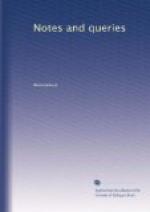Yours, &c.
G.G.
[1] It is perhaps right to give his words. Speaking of a person who acted as their guide, he says:—“Des folgenden Tages gieng er mit uns 22 engl. Meilen bis Colchester zu Fuss; wo wir uns auf die Land-Kutsche verdungen, mit welcher wir 50 englische Meilen d. i. 10 teutsche Meilen bis London, in solcher Geschwindigkeit endigten, dass wir auf dem ganzen Wege kaum 6 Stunden gefahren sind; so schnell gehen die englischen Pferde; aber auch so schoen sind die englischen Wege.” Der Leitungen des Hoechsten, &c. Zw. Theil. Halle, 1772, p.62.
* * * * *
SANUTO’S DOGES OF VENICE.
Mr. Editor,—Among the well-wishers to your projected periodical, as a medium of literary communication, no one would be more ready to contribute to it than myself, did the leisure I enjoy permit me often to do so. I have been a maker of Notes and Queries for above twenty-five years, and perhaps should feel more inclined to trouble you with the latter than the former, in the hope of clearing up some of the many obscure points in your history, biography, and poetical literature, which have occurred to me in the course of my reading. At present, as a very inadequate specimen of what I once designed to call Leisure Moments, I beg to copy the following Note from one of my scrap-books:—
In the year 1420, the Florentines sent an embassy to the state of Venice, to solicit them to unite in a league against the ambitious progress of Filippo Maria Visconti, Duke of Milan; and the historian Daru, in his Histoire de Venise, 8vo., Paris, 1821, has fallen into more than one error in his account of the transaction. Marino Sanuto, who wrote the lives of the Doges of Venice in 1493 (Daru says, erroneously, some fifty years afterwards), has preserved the Orations made by the Doge Tomaso Mocenigo, in opposition to the Florentine proposals; which he copied, according to his statement, from a manuscript that belonged to the Doge himself. Daru states, that the MS. was communicated to him by the Doge; but that could not be, since the Doge died in 1423, and Sanuto was not born till 1466. An abridged translation of these Orations is given in the Histoire de Venise, tom. ii, pp. 289-311.; and in the first of these, pronounced in January, 1420 (1421, Daru), he is made to say, in reference to an ambassador sent by the Florentines to the Duke of Milan, in 1414, as follows: “L’ambassadeur fut un Juif, nomme Valori, banquier de sa profession,”, p. 291. As a commentary on this passage, Daru subjoins a note from the Abbe Laugier, who, in his Histoire de Venise, liv. 21., remarks, 1. That it appears strange the Florentines should have {36} chose a Jew as an ambassador; 2. That his surname was Bartolomeo, which could not have been borne by a Jew; 3. That the Florentine historian




